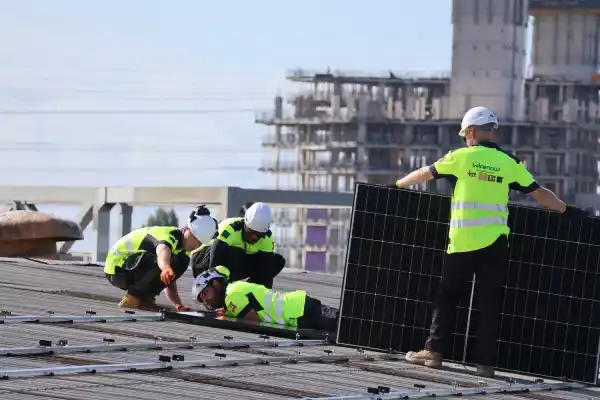
As someone who’s worked in the electrical and construction sector for over a decade — as both an employer and a qualified Site Manager — I’ve seen how the right training can transform a career, and how the wrong kind can hold people back.
Too often, “beginner” electrical courses focus on theory alone. Learners leave knowing the symbols on a circuit diagram, but not how to safely isolate power, identify cable types, or manage the real-world risks they’ll face on site. That gap between classroom learning and workplace competence is what inspired me and my team at Learn Trade Skills to create the Basic Electrical Course — a programme built by the industry, for the industry.
This course isn’t just another introduction to electrics. It’s an EAL-approved qualification with integrated CPD (Continuing Professional Development) modules that meet the exact needs of today’s construction and maintenance workforce. It covers the fundamentals of electrical work, while also addressing the three biggest causes of accidents and ill-health in the trade: asbestos exposure, manual handling injuries, and working at height incidents.
Competence has always been a legal requirement under the Electricity at Work Regulations 1989, but recent data from the Health and Safety Executive (HSE) makes the need for verified training clearer than ever:
These numbers show the real cost of inadequate training. CPD ensures that everyone on site — from apprentices to supervisors — stays up to date, competent, and compliant with the expectations set out by the HSE and by employers who take safety seriously.
The Basic Electrical Course delivers the perfect blend of classroom learning, hands-on practice, and structured CPD. Here’s a closer look at what’s included:
The CPD components of our programme are more than just tick-boxes — they directly address the real hazards identified in HSE research and on live sites.
Together, these modules ensure that graduates of our Basic Electrical Course are competent not only in electrical skills but also in the broader responsibilities of working safely and legally.
The Basic Electrical Course has been designed with a broad audience in mind, reflecting the diversity of today’s trades sector:
This programme has been developed in partnership with EAL, one of the UK’s leading awarding organisations for engineering and building services qualifications.
That means when learners complete the course, they earn a certificate backed by an awarding body recognised across the electrical industry.
The industry increasingly demands proof of ongoing competence.
From major contractors to local authorities, clients now ask for evidence that workers and subcontractors have current CPD or refresher training.
Failing to demonstrate this can affect tenders, insurance and audit compliance.
A 2024 Construction Industry Training Board (CITB) report highlights a growing skills gap, predicting that the UK will need an additional 251,000 construction workers by 2028 — particularly in electrical and maintenance roles.
Courses like ours directly support that demand by equipping new entrants and cross-trades with safe, verifiable skills.
What is the Basic Electrical Course?
It’s an EAL-approved foundation course that teaches hands-on electrical skills and essential safety awareness. It’s tailored by active industry professionals to meet real-world standards.
What makes this course different?
It combines practical electrical training with structured CPD covering asbestos awareness, manual handling, and working at height. That makes it unique in addressing the full spectrum of site risks.
How long does the course take?
It’s delivered as an intensive in-centre programme with guided learning hours designed for beginners and cross-trades.
Will I get a recognised qualification?
Yes. You’ll earn an EAL Approved Certificate in Basic Electrical Skills, backed by a nationally recognised awarding body.
Does this count toward my professional development?
Absolutely. Your CPD credits demonstrate compliance and competency, supporting your professional portfolio and employer audits.
Can I become a fully qualified electrician after this course?
This is your starting point. It provides the foundation to progress into qualifications such as 18th Edition Wiring Regulations (BS 7671), Part P, or the Gold Card Electrical Pathway.
The electrical industry needs competent, safety-aware professionals more than ever.
That’s why we built a course that goes beyond classroom theory — combining EAL-approved technical training with CPD modules rooted in HSE data and site reality.
The Basic Electrical Course isn’t just about learning electrics. It’s about building a safer, stronger, and more capable workforce — one learner at a time.
If you’re ready to take that step, visit learntradeskills.co.uk or call our team to enrol today.
Tolga Aramaz is the Director of Learn Trade Skills (LTS), a family-run training centre specialising in electrical installations. With years of experience and a deep understanding of the electrical industry, Tolga is known for their exceptional organisational skills, attention to detail, and commitment to delivering outstanding results. They provide valuable insights and guidance to electricians, contractors, and businesses, ensuring compliance with industry regulations and safety protocols. Through engaging training programmes and consultancy services, Tolga empowers professionals to excel in their roles, fostering long-term relationships built on professionalism and customer satisfaction.
“Lorem ipsum dolor sit amet, consectetur adipiscing elit. Ut pretium tristique purus nec consectetur. Nulla feugiat eget tellus aliquam scelerisque. Sed eget luctus enim, sed mattis enim. Lorem ipsum dolor sit amet, consectetur adipiscing elit. Ut pretium tristique purus nec consectetur. Nulla feugiat eget tellus aliquam scelerisque. Sed eget luctus enim, sed mattis enim.Nulla feugiat eget tellus aliquam scelerisque. Sed eget luctus enim, sed mattis enim. Lorem ipsum dolor sit amet, consectetur adipiscing elit. Ut pretium tristique purus nec consectetur. Nulla feugiat eget tellus aliquam scelerisque. Sed eget luctus enim, sed mattis enim.”
William Goss
Electrician course
11/11/2024